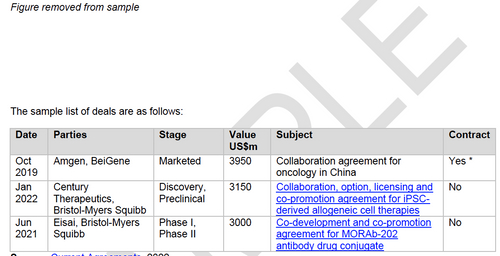Product Description
Antibody Collaboration and Licensing Deals 2019-2024
- Publication date: May 2024
- Page count: 1100+
- Format: Interactive PDF and online
- Edition no: 4
Antibody Collaboration and Licensing Deals provides a comprehensive understanding and unprecedented access to the antibody deals entered into by the worlds leading biopharma companies.
Fully revised and updated, the report provides details of antibody deals from 2019 to 2024.
The report provides a detailed understanding and analysis of how and why companies enter antibody deals. These deals tend to be multicomponent, starting with collaborative R&D, and commercialization of outcomes.
The report includes collaboration, development, research and licensing deals.
This report contains a comprehensive listing of 1328 antibody deals announced since 2019 including financial terms where available including links to online deal records of actual antibody partnering deals as disclosed by the deal parties. In addition, where available, records include contract documents as submitted to the Securities Exchange Commission by companies and their partners.
The initial chapters of this report provide an orientation of antibody dealmaking.
Chapter 1 provides an introduction to the report.
Chapter 2 provides an overview of the trends in antibody dealmaking since 2019.
Chapter 3 provides an overview of the leading antibody deals since 2019. Deals are listed by headline value.
Chapter 4 provides a comprehensive listing of the top 25 most active companies in antibody dealmaking with a brief summary followed by a comprehensive listing of antibody deals, as well as contract documents available in the public domain.
Chapter 5 provides a comprehensive and detailed review of antibody deals signed and announced since Jan 2019, where a contract document is available in the public domain.
Chapter 6 provides a comprehensive and detailed review of antibody partnering deals signed and announced since Jan 2019. The chapter is organized by specific antibody technology type in focus.
The report also includes numerous table and figures that illustrate the trends and activities in antibody deal making since 2019.
In addition, a comprehensive deal directory is provided organized by company A-Z, deal type and therapeutic target. Each deal title links via Weblink to an online version of the deal record and where available, the contract document, providing easy access to each contract document on demand.
Key benefits
Antibody Collaboration and Licensing Deals provides the reader with the following key benefits:
• Understand deal trends since 2019
• Browse antibody collaboration and licensing deals
• Benchmark analysis – identify market value of transactions
• Financials terms - upfront, milestone, royalties
• Directory of deals by company A-Z, deal type and therapy area
• Leading deals by value
• Most active dealmakers
• Identify assets and deal terms for each transaction
• Access contract documents - insights into deal structures
• Due diligence - assess suitability of your proposed deal terms for partner companies
• Save hundreds of hours of research time
Report scope
Antibody Collaboration and Licensing Deals is intended to provide the reader with an in-depth understanding of antibody trends and structure of deals entered into by leading biopharma companies worldwide.
Antibody Collaboration and Licensing Deals includes:
• Trends in antibody dealmaking in the biopharma industry
• Directory of antibody deal records covering pharmaceutical and biotechnology
• The leading antibody deals by value
• Most active antibody licensing dealmakers
Antibody Collaboration and Licensing Deals provides comprehensive access to available records for deals, including contract documents where available.
Analyzing contract agreements allows due diligence of:
• What are the precise rights granted or optioned?
• What is actually granted by the agreement to the partner company?
• What exclusivity is granted?
• What is the payment structure for the deal?
• How are sales and payments audited?
• What is the deal term?
• How are the key terms of the agreement defined?
• How are IPRs handled and owned?
• Who is responsible for commercialization?
• Who is responsible for development, supply, and manufacture?
• How is confidentiality and publication managed?
• How are disputes to be resolved?
• Under what conditions can the deal be terminated?
• What happens when there is a change of ownership?
• What sublicensing and subcontracting provisions have been agreed?
• Which boilerplate clauses does the company insist upon?
• Which boilerplate clauses appear to differ from partner to partner or deal type to deal type?
• Which jurisdiction does the company insist upon for agreement law?












